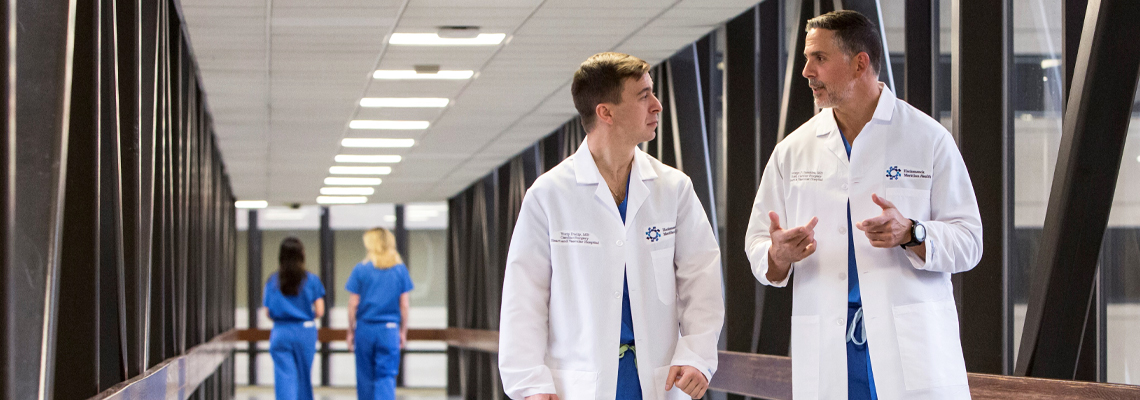
When Zechariah (Zech) Kaehr of Columbus, Ohio, was 15, he began to notice pain in his back and side that got worse with eating and exercise. Later, he developed blood in his urine, nausea, vomiting and weight loss.
Zech was diagnosed with nutcracker syndrome, a rare condition in which his left renal vein, which drains blood from the kidney, is tightly squeezed between two arteries. The compressed renal vein causes a backflow of blood into the kidney, which resulted in the symptoms Zech was experiencing.
Searching For a Surgeon
Zech knew he needed to have surgery to treat his condition. However, he was unable to find a pediatric urologist to perform the complex vascular procedure he needed.
“It was unheard of for a pediatric surgeon to do this procedure, so I managed my symptoms for about two years until I turned 18,” Zech said.
Under the care of his urologist in Ohio, Zech tried to gain weight to relieve pressure on the vein, but his symptoms made it difficult for him to eat.
“At my lowest weight, I was 110 lbs. at six feet tall,” said Zech. “I had very low energy and was unable to do normal things, so I was feeling very depressed.”
Zech’s mom conducted extensive research on treatment options and, with the help of a co-worker, was referred to Hackensack University Medical Center. A televisit was quickly arranged with urologist Kevin R. Basralian, M.D., who sprung into action completing the work up and obtaining the necessary tests to confirm Zech’s condition.
Dr. Basralian consulted his partner, Michael D. Stifelman, M.D., Chair of Urology and Director of Robotic Surgery at Hackensack University Medical Center and Professor and Founding Chair of Urology at Hackensack Meridian School of Medicine, to assist with the case.
Upon reviewing the literature, consulting with Massimo Napolitano, M.D., Chair of Vascular Surgery at Hackensack University Medical Center, and outlining the various treatment options with Zech, Dr. Stifelman recalls, “It was clear that the best option would be to transpose the vein. In other words, we would reconnect the vein lower down on the vena cava to change the angle and get the vein out of harm’s way.”
“Honestly, the speed of the process was remarkable – from consultation to surgery, it was about eight weeks,” said Zech. “It was effortless.”
A First-of-its-Kind Procedure
On March 31, 2021, Dr. Stifelman was the first surgeon in the northeast to perform a minimally invasive robot-assisted renal vein transposition to treat nutcracker syndrome. Previous procedures to treat nutcracker syndrome were performed using open surgical techniques, which required large incisions, higher surgical risks, and a lengthy recovery time.
During the two-hour procedure, Dr. Stifelman made four quarter-inch incisions at Zech’s pants line and inserted the robotic surgical instruments. He temporarily stopped the blood from the two renal veins and the vena cava, which carries blood from the lower body and torso to the heart.
Next, Dr. Stifelman cut the left renal vein at the vena cava, sewed up the vena cava, and moved the affected left renal vein to a lower position on the vena cava before re-establishing blood flow. Dr. Napolitano was present throughout the procedure, serving as a second pair of eyes to confirm all principles of vascular surgery were followed.
Zech spent one day in the hospital after surgery before being discharged. Six weeks after surgery, he resumed normal activities, gained five pounds, and returned to exercising, full-time work and school with no more debilitating pain or blood in his urine.
“Not only can we do complex robotic vascular procedures, but using a multidisciplinary approach, we’ve created a reproducible, proven surgical solution for nutcracker syndrome,” said Dr. Stifelman. “Leveraging robotic technology allows us to achieve outstanding surgical results through very small incisions, leading to a shorter recovery time and less discomfort for patients.”
Getting ‘Back to Life’
Zech said he is incredibly grateful to Dr. Stifelman and his team because many other people with nutcracker syndrome have to wait much longer to receive the surgical care they need and require a large midline incision that requires a long recovery time.
“I wasn’t scared before the surgery, and I had no anxiety,” said Zech, who is finishing up his Associate’s degree and hopes to pursue a career in health care. “Dr. Stifelman took out a roadblock in my life, and now I am back to living.”
Next Steps & Resources:
Meet our sources: Kevin R. Basralian, M.D., Massimo Napolitano, M.D., and Michael D. Stifelman, M.D.
To make an appointment with a doctor near you, call 800-822-8905 or visit our website.